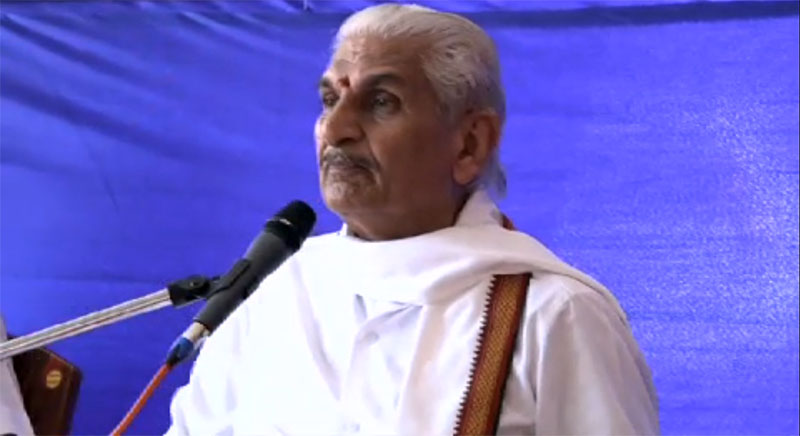Mangaluru: RSS leader Kalladka Prabhakar Bhat has once again stirred controversy with a controversial remark, a video of which has now gone viral in local circles. In the video, Bhat can be heard comparing Ullal and ‘other parts of the country’ to Pakistan.
In the video, Bhat is addressing an event and has said “Ullal, along with few other parts of the country are now similar to Pakistan”.
According to the reports, Bhat made the remarks when he was addressing an event at the Keshav Shishumandir in Kinya village of Mangaluru Taluk, the event reportedly was held on Sunday, November 1. The video is now doing rounds across social media platforms.
“If you visit Ullal, don’t you feel like you are in Pakistan? Several parts of the country have now become Pakistan” Bhat has said in the video.
“If you have one child at the house, that child becomes selfish. If you have multiple kids, you will have more joy and happiness in the house. Now the population of Hindus in society is less. Ask anyone in Kinya who is there all around? And I don’t have to mention Ullal. Who will save our temples? Who will save our cultures and traditions? Why these places have turned into Pakistan? Our population has decreased, their population has increased. This is how Pakistan and Bangladesh were created” Bhat added in the video.
Reacting to Bhat’s video, Ishwar Ullal, a Management member of Uma Maheshwari temple in Kapikad-Ullal said “Ullal is a peaceful place, there is the atmosphere like Pakistan as remarked by Bhat. Both Hindus and Muslims are living with unity. These BJP and RSS people want to disturb peace and harmony in the region, hence they are giving such statements”.
“This is a provocative speech powered by BJP through Kalladka Prabhakar Bhat, the motive behind this remark is to communalize the region and to take political mileage. People in and around Ullal are living with peace and unity and that is not going down well with the BJP. They want to create hatred among people and disturb the peace. BJP won 7 assembly seats in the district. And this is their ploy to win in Ullal as well but they will not succeed in this” Santosh Kumar Shetty, Congress’ Ullal Block President said.
Former councilor of Ullal Municipality, Dinesh Rai also slammed Bhat over his remarks and said “Did he say Ullal is like Pakistan? His statement is condemnable, there are people of all religions and communities in Ullal, we all live with unity and brotherhood here. They can’t disturb peace and harmony here”.
When contacted by Vartha Bharati, top police officials of the city refused to comment on the matter.
Let the Truth be known. If you read VB and like VB, please be a VB Supporter and Help us deliver the Truth to one and all.
This year, Ramadan and Lent are reportedly being observed during the same period, a calendar overlap that happens only once in roughly 30 to 33 years.
According to a post by ‘That Dubai Page’ on Instagram both are important periods of fasting in Islam and Christianity respectively, but they follow different calendars, which is why their dates usually do not align.
What is Lent?
Lent is a 40-day period in the Christian liturgical calendar observed before Easter.
It is marked by fasting, prayer, repentance and self-examination.
The duration of 40 days reflects the time Jesus is believed to have fasted in the wilderness. Lent begins on Ash Wednesday and ends before Easter Sunday, and the feast mass is celebrated on Saturday.
The exact dates change every year because they are linked to Easter, which is calculated based on the Christian liturgical calendar.
What is Ramadan?
Ramadan is the ninth month of the Islamic lunar calendar and is observed by Muslims worldwide as a month of fasting, prayer and spiritual discipline. From dawn to sunset each day, adult and able-bodied Muslims abstain from food and drink. The fast is broken at sunset.
Unlike Lent, Ramadan does not follow the Gregorian calendar.
According to admiddleeast.com , Ramadan depends on the sighting of the new crescent moon, known as the hilāl, which signals the start of the new lunar month.
Religious committees in many Muslim-majority countries meet after sunset on the 29th day of the preceding month, Sha‘ban, to look for the moon.
If it is sighted, Ramadan begins the next day. If not, Sha‘ban is completed as a 30-day month and Ramadan starts after that.
While Saudi Arabias announcement is widely followed, each country makes its own official declaration.
Why dont they always overlap?
The Islamic lunar calendar has around 354 days, which is about 10 to 11 days shorter than the Gregorian calendar.
Because of this difference, Ramadan shifts earlier by about 10 or 11 days each year. Over time, it moves through all seasons.
Lent, on the other hand, is tied to Easter and the Christian liturgical calendar. Since the two religious observances are based on different systems for calculating dates, they rarely fall at the same time.
How often does the overlap happen?
The overlap happens in cycles of approximately 30 to 33 years. When it happens, Ramadan and Lent may coincide for a few consecutive years. After that, they do not align again for decades.
Following the current cycle, major overlaps are not expected again until the 2050s.





